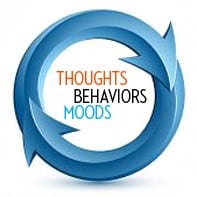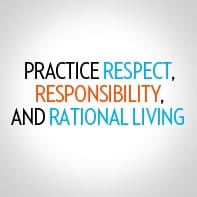In the early stages of most relationships 3 things hold true. First we are likely to have limited experiences with the other person; second, we are likely to have limited expectations specific to that person; and third, we are likely to experience more ups and downs with that person.
This is because when someone else’s behavior exceeds OUR personal expectations in either a positive or negative way we feel a strong emotional response. So in the early stages it’s easy to extend beyond our limited expectations. Thus, it’s common to frequently experience intense joy and excitement or grave disappointment and frustration when any relationship begins.
For example, if someone you are newly dating calls you to say “hello” in the middle of your day, you may feel a flutter of excitement. This is the same process that leaves you feeling “turned off” when a new acquaintance acts rudely towards you.
In the later stages
The longer we engage in the relationship, the more our expectations grow and become ingrained as a part of everyday life.
As a result positive and negative emotions occur when the other person’s behavior breaks or exceeds the expectations-you-have-melded-together in such a way that it interrupts “typical on-going behaviors.” So, when things are running smoothly, there are fewer interruptions and less intense emotions.
So now, not only do you begin to expect that phone call,
…. you become annoyed when it does not come
….while at the same time, your sense of excitement for the call wears off.
Detrimental
Under estimating how important that particular call is a detrimental-habit that occurs in many long -term relationships. In fact according to Ellen Berscheid’s “Emotion-in-Relationships Model” partners in long-term romantic relationships are most likely to underestimate their emotional investment in the relationship when things are running smoothly. Under estimating the value of something often leads to neglect, lack of appreciation, and thus often a soured relationship.
Reducing Resentment
Noting the important behaviors in maintaining the smoothness of a relationship not only saves a lot of grief, but it helps us feel in control of our relationships. Control helps us to acknowledge and reward our own contributions to a healthy relationship so that we are likely take pride in our behavioral investments rather than discount their significance and become negligent or resentful.
This investment principle applies to work place and home systems as well.
Maintaining is for you!
Think about the last time you did not do your laundry over the weekend or failed to update your outlook calendar. Neglecting such a simple task may have caused havoc at work or made your week of getting dressed that much more stressful. This is because like in our relationships, we come to expect certain actions from ourselves and from our organizations. So the next time you want to complain about doing your laundry or about having to fill out routine paper work, think about what the investment provides you and what would happen if you did not invest.
What to do: To improve the perceived value of each relationship or organization related task:
Start by brainstorming a list of regular things you do for yourself, your partner, friends or work place organization. This will give you insight into the expectations others have of you, based on your own actual contributions. So not only will this help you to understand where the expectations of others are coming from, but it will also provide opportunity to take each behavior’s real contribution to success and “smoothness ” into account.
Some areas to consider:
• Communication: Think about the frequency and quality of your communications. How often do you exchange emails, texts and calls throughout the day, week or month? What is the context and emotion/tone to these communications? Do you close the door to your office or go to a quiet area when you are on phone with certain people?
• Face- to- Face Time: How often do you reserve time to be alone with certain people? Do you commonly have weekly family dinners or sleep in on weekend mornings so you can spend special time with your partner? Do you hold weekly meeting with your assistant so that he can have your undivided time and attention?
• Gifts & Finances: How much do you provide regularly of others in the way of finances or gifts? Do you regularly contribute to bills and leisure outings? Do you buy thoughtful or expensive gifts? Do you give them an annual bonus?
• House hold chores: How often do you do your laundry, clean your tub or organize your closets?
• Administrative Tasks: Are you required to submit a weekly log or record sales calls in a database? Certain activities like filling out your weekly time sheet or filing & sorting mail are some examples of activities that if neglected can wreak havoc on basic organizational functioning.
Now ask yourself how not doing each of these items would effect your, another persons’ or your organization’s functioning?
Developing a deeper understanding of what is expected of you based on what you are contributing can be the difference between doing something begrudgingly & eventually becoming resentful versus carrying out a task because it brings you value, a sense of self accomplishment and harmony to your world.
Best
Dr Jayme
For more information about consulting with Dr Jayme for Psychotherapy or organizational consulting work email her at DrJayme@askthecbt.com or 212-631-1133 ext 1

















Dr. Jayme,
As I read through your article I saw so many examples of how I have expectations for others but honestly never considered the expectations others may have of me purposely or by default. This article is very valuable in helping others to realize how expectations can shape any relationship.
I will be sharing this with all my friends!
Live Full Out with Passion & Purpose.
Susan
Dr. Jayme,
As I read through your article I saw so many examples of how I have expectations for others but honestly never considered the expectations others may have of me purposely or by default. This article is very valuable in helping others to realize how expectations can shape any relationship.
I will be sharing this with all my friends!
Live Full Out with Passion & Purpose.
Susan